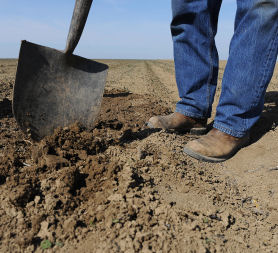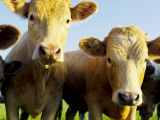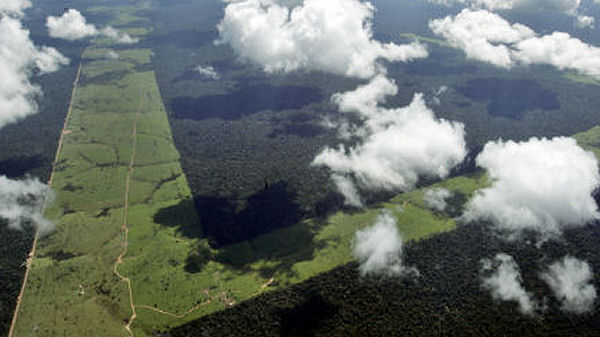Ten ideas to save the planet: the growing problem
Agriculture is the second largest source of UK greenhouse gases contributing to seven per cent of total emissions. So how will cultivation evolve in order to meet climate targets?

What idea policy or technology holds the greatest promise for tackling climate change? That was the question Channel 4 News posed to the scientific community over the past few weeks.
Thanks to the extensive contacts of the Science Media Centre at the Royal Institution Channel 4 News was able to email hundreds of scientists across various fields of expertise to sound-out their opinions.
Britain’s grasslands contain as much carbon as our entire CO2 emissions. But increasing demands of food production mean shifting land from a carbon sink to a carbon source means agriculture is becoming a frontline of climate change.
A number of scientists who contacted us, such as Patricia Harvey from the University of Greenwich, believe that “plant-based technologies have to be embraced” in order to mitigate climate change.
Reengineering crops so they have a low input but a high output could be part of this solution.
Climate change: 10 ideas to save the planet
“Recent gains in crop yield have been made using plant varieties that depend on environmentally and economically unsustainable inputs of fertiliser, pesticides and herbicides,” said Dr Huw Jones from Rothamsted Research.
“Desired traits, such as ability to fix nitrogen, C4 metabolism, durable pest and disease resistance exist in diverse plant species.
“The challenge is to genetically combine these traits into new crop varieties.”
Monsanto’s sustainable yield initiative was launched to address climate change adaption and mitigation.
The American company believes that by 2030 it is possible to double yields in core crops (corn, cotton, soybeans) while reducing key inputs (nutrients, water, energy) by a third.
David Gustafson from the company told Channel 4 News that they were pursuing various technologies including drought and herbicide tolerant crops, reducing nitrous oxide emissions and solar powered insect control.
Biochar
Soils create natural carbon sinks by absorbing and storing CO2 indefinitely.
In the natural carbon cycle, plants emit CO2 during decomposition – a process which is carbon neutral.
Instead of allowing the plant matter to decompose, pyrolysis can be used to seize and store carbon in a much more stable charcoal form known as biochar. Biochar is used to absorb atmospheric CO2 and stores it virtually permanently in a carbon negative process.
“Biochar is taking on increasing importance in the climate change mitigation argument.
“James Lovelock claims it is the only hope to avert climate disaster whereas George Monbiot dismisses as “misguided” the suggestion of biochar as a universal solution.
“We think the truth lies somewhere in the middle and are pressing ahead with trials,” said Matt Dolan from the Low Carbon Innovation Centre.
Professor Stuart Hazseldine from the University of Edinburgh acknowledged that reducing emissions rapidly was “possibly the best investment we will ever make.”
“It will be necessary to take CO2 out of the atmosphere.
“Using plants is an established technology, which is self-replicating, and can be applied globally. Adapting charcoal made from plants to become a no-emission storage of carbon in the soil (biochar) appears to work, by storing CO2 thousands of years.”

Methane makers
We have all been urged to fly and drive less to slow down climate change but could reducing our meat consumption be the real answer?
In June Paul McCartney launched his campaign for a “meat free Monday” after a United Nations report showed that meat production accounts for a fifth of all greenhouse gas emissions.
Emissions related to meat consumption come in many components including land use, transportation and the refrigeration of meat.
Nitrous oxide and methane are also present in the manure and flatulence of animals reared for meat. Westerns cows are thought to emit 120kg of methane every year compared with just 0.12kg from humans.
But some scientists do not believe that reducing the demand for meat will solve the issue as a large proportion cows are not reared for their meat but rather for work and milk.
The government’s environment department believe that farmers can tackle and adapt to climate change as part of developing a sustainable agricultural business.
But with leading authorities, such as Lord Stern, urging consumers to think twice about eating meat, will agriculture need a dramatic change in order to save itself from the changing climate?
Forestry
“Whilst governments deliberate over policy, more than 12 million hectares of rainforest are destroyed each year.
“In the time it takes for a working policy to be in place we could have lost much of the rainforest and with it one of the best chances to stop climate change,” said Dominick Spracklen form the University of Leeds in response to our question on climate change.

“Business can play an immediate and leading role through funding practical action to slow deforestation and turning one of the greatest challenges of our time into the greatest business opportunity of our time,” he said.
The Forestry Commission says that deforestation accounts for almost 20 per cent of annual global emissions.
Trees have the unique ability of reducing and storing carbon dioxide which helps in the fight against emissions, the commission says.
The woodland of Britain must also play a role, they believe, by being managed as a sustainable source of wood.
-
Latest news
-
How drug gangs operate in Europe’s most dangerous city11m

-
Debate: Should there be an election in Scotland?6m

-
How Yousaf resignation could spell end of SNP dominance in Scotland3m

-
Rwanda effect on asylum seeker numbers ‘doubtful’, says Irish MEP4m

-
How is the UK’s Rwanda asylum plan impacting Ireland?8m

-




